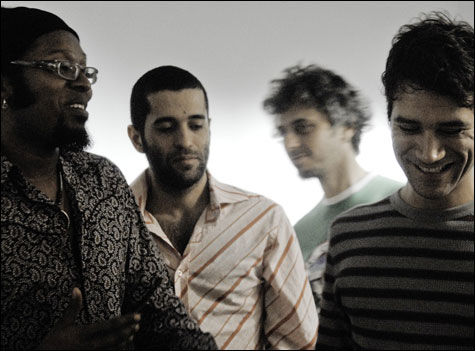
SÃO JOÃO NORTH “If you don’t like Bob Marley . . . you better stay away from me,” sing Forro in the Dark. |
WFNX Jazz Brunch Top Five
1. James Carter, Present Tense [Emarcy]
2. Laszlo Gardony, Dig Deeper [Sunnyside]
3. Esperanza Spalding, Esperanza [Heads Up]
4. Travis Sullivan’s Björkestra, Enjoy [Koch]
5. Cassandra Wilson, Loverly [Blue Note] |
Boston has its own vital scene of pan-American jazz and folk (hey, Mili Bermejo, Alex Alvear, Sergio Brandão, and everyone at Ryles on Wednesday nights!). But in a couple of weeks we’ll be getting a good shot of Portuguese and Spanish grooves NYC-style when the band Forro in the Dark and singer-songwriter Marta Topferova hit the MFA’s courtyard concert series.Forro in the Dark play the percussive dance music of northeastern Brazil, a more rustic country cousin of Rio’s samba, but with a genre-bending New York twist. Although they’re all from Brazil, the four members of the band had come to the US separately to play music. They met at the Lower East Side club Nublu. “It was 2002, my birthday,” says the percussionist Mauro Refosco over the phone from New York. “I celebrated there, and I asked a few friends to play forró music because people outside of Brazil are not familiar with it. There are a few compilations — David Byrne had one on Luaka Bop — but people hadn’t experienced it live.” There was another reason: unlike the more sophisticated bossa nova, forró is hard-driving dance music, party music.
Forro in the Dark became a weekly event at Nublu and eventually recorded on the club’s label. This was a well-connected bunch, with broad experience as individual sidemen in various projects. Refosco’s boss, David Byrne, heard the percussionist between shows playing the Luiz Gonzaga/Humberto Teixeira classic “Asa Branca” on guitar and offered to write English lyrics for it. He sang that and the Byrne/Forro in the Dark original C&W number “I Wish (Bundle of Contradictions)” on the band’s American debut, Bonfires of São João. Miho Hatroi of Cibo Matto had been working with the band’s American guitarist, Smokey Hormel (no longer with the group), as part of their Brazilian duo project Smokey & Miho, and she sent a tape, in Japanese, of Gonzaga & Teixera’s “Paraíba” and ended up singing it on the CD. The band had also been backing Bebel Gilberto, who contributed the Peggy Lee–associated Gonzaga/Teixeira “Wandering Swallow (Juazeiro).”
Forro in the Dark go way beyond the traditional instrumentation of forró — accordion, triangle, and the zabumba parade bass drum — to electric guitars, bass, baritone sax, bass clarinet, and Jorge Continentino’s virtuoso playing of the traditional pifano wood flute. The whole thing rocks — from the clip-clop forró-cumbía rhythms of “Forrowest” and “Limoeiro do Norte” to the slower samba-like groove of Caetano Veloso’s “Cajuína” with Continentino’s baritone.
The various Latin-American rhythms on Forro’s discs tend to morph and suggest other affinities — surf rock, rockabilly, European polkas, reggae. “Nonsensical,” the opener from the band’s new EP, Dia de Roda, has a hilarious, touching vocal turn by Davi Vieira, who drawls over the forró-cumbía clip-clop: “If you don’t like Bob Marley . . . you better stay away from me,” Guilherme Monteiro’s guitar chanking in the background. It’s one song where it’s hard to tell the difference between forró and reggae.